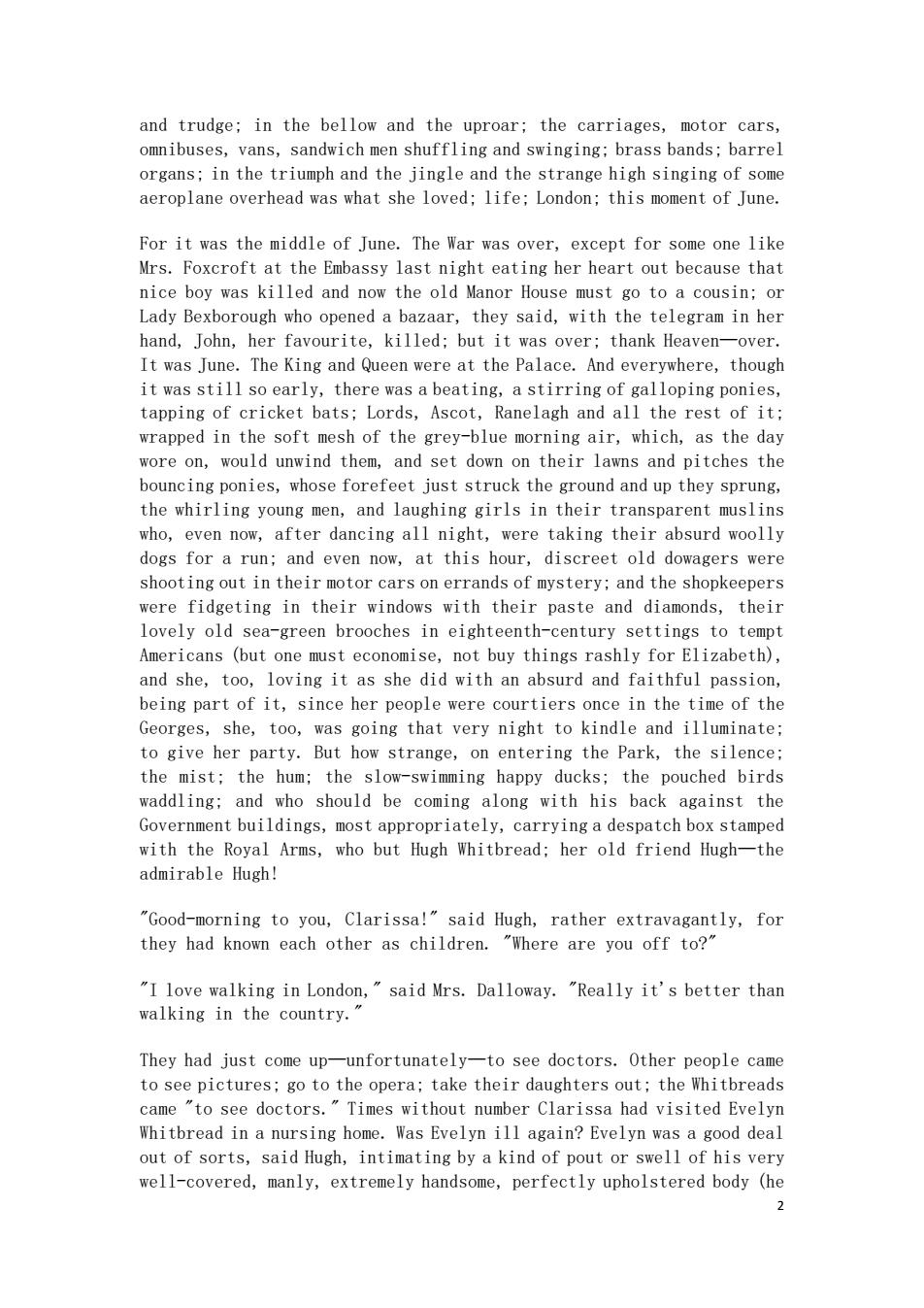正在加载图片...

and trudge;in the bellow and the uproar;the carriages,motor cars, omnibuses,vans,sandwich men shuffling and swinging;brass bands;barrel organs;in the triumph and the jingle and the strange high singing of some aeroplane overhead was what she loved;life;London;this moment of June. For it was the middle of June.The War was over,except for some one like Mrs.Foxcroft at the Embassy last night eating her heart out because that nice boy was killed and now the old Manor House must go to a cousin;or Lady Bexborough who opened a bazaar,they said,with the telegram in her hand,John,her favourite,killed;but it was over;thank Heaven-over. It was June.The King and Queen were at the Palace.And everywhere,though it was still so early,there was a beating,a stirring of galloping ponies, tapping of cricket bats;Lords,Ascot,Ranelagh and all the rest of it; wrapped in the soft mesh of the grey-blue morning air,which,as the day wore on,would unwind them,and set down on their lawns and pitches the bouncing ponies,whose forefeet just struck the ground and up they sprung, the whirling young men,and laughing girls in their transparent muslins who,even now,after dancing all night,were taking their absurd woolly dogs for a run;and even now,at this hour,discreet old dowagers were shooting out in their motor cars on errands of mystery;and the shopkeepers were fidgeting in their windows with their paste and diamonds,their lovely old sea-green brooches in eighteenth-century settings to tempt Americans (but one must economise,not buy things rashly for Elizabeth), and she,too,loving it as she did with an absurd and faithful passion, being part of it,since her people were courtiers once in the time of the Georges,she,too,was going that very night to kindle and illuminate; to give her party.But how strange,on entering the Park,the silence; the mist;the hum;the slow-swimming happy ducks;the pouched birds waddling;and who should be coming along with his back against the Government buildings,most appropriately,carrying a despatch box stamped with the Royal Arms,who but Hugh Whitbread;her old friend Hugh-the admirable Hugh! "Good-morning to you,Clarissa!"said Hugh,rather extravagantly,for they had known each other as children."Where are you off to?" "I love walking in London,"said Mrs.Dalloway."Really it's better than walking in the country." They had just come up-unfortunately-to see doctors.Other people came to see pictures;go to the opera;take their daughters out;the Whitbreads came "to see doctors."Times without number Clarissa had visited Evelyn Whitbread in a nursing home.Was Evelyn ill again?Evelyn was a good deal out of sorts,said Hugh,intimating by a kind of pout or swell of his very well-covered,manly,extremely handsome,perfectly upholstered body (he 22 and trudge; in the bellow and the uproar; the carriages, motor cars, omnibuses, vans, sandwich men shuffling and swinging; brass bands; barrel organs; in the triumph and the jingle and the strange high singing of some aeroplane overhead was what she loved; life; London; this moment of June. For it was the middle of June. The War was over, except for some one like Mrs. Foxcroft at the Embassy last night eating her heart out because that nice boy was killed and now the old Manor House must go to a cousin; or Lady Bexborough who opened a bazaar, they said, with the telegram in her hand, John, her favourite, killed; but it was over; thank Heaven—over. It was June. The King and Queen were at the Palace. And everywhere, though it was still so early, there was a beating, a stirring of galloping ponies, tapping of cricket bats; Lords, Ascot, Ranelagh and all the rest of it; wrapped in the soft mesh of the grey-blue morning air, which, as the day wore on, would unwind them, and set down on their lawns and pitches the bouncing ponies, whose forefeet just struck the ground and up they sprung, the whirling young men, and laughing girls in their transparent muslins who, even now, after dancing all night, were taking their absurd woolly dogs for a run; and even now, at this hour, discreet old dowagers were shooting out in their motor cars on errands of mystery; and the shopkeepers were fidgeting in their windows with their paste and diamonds, their lovely old sea-green brooches in eighteenth-century settings to tempt Americans (but one must economise, not buy things rashly for Elizabeth), and she, too, loving it as she did with an absurd and faithful passion, being part of it, since her people were courtiers once in the time of the Georges, she, too, was going that very night to kindle and illuminate; to give her party. But how strange, on entering the Park, the silence; the mist; the hum; the slow-swimming happy ducks; the pouched birds waddling; and who should be coming along with his back against the Government buildings, most appropriately, carrying a despatch box stamped with the Royal Arms, who but Hugh Whitbread; her old friend Hugh—the admirable Hugh! "Good-morning to you, Clarissa!" said Hugh, rather extravagantly, for they had known each other as children. "Where are you off to?" "I love walking in London," said Mrs. Dalloway. "Really it's better than walking in the country." They had just come up—unfortunately—to see doctors. Other people came to see pictures; go to the opera; take their daughters out; the Whitbreads came "to see doctors." Times without number Clarissa had visited Evelyn Whitbread in a nursing home. Was Evelyn ill again? Evelyn was a good deal out of sorts, said Hugh, intimating by a kind of pout or swell of his very well-covered, manly, extremely handsome, perfectly upholstered body (he